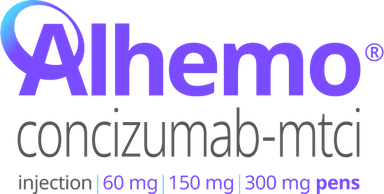
Antibody antagonist of endogenous TFPI that enhances FXa production, during initiation phase of coagulation2
Leads to improved thrombin generation and clot formation with the goal of achieving hemostasis3
Effect of Alhemo® is not influenced by the presence of inhibitory antibodies to FVIII or FIX3
No structural relationship between Alhemo® and FVIII or FIX
Alhemo® does not induce or enhance the development of direct inhibitors to FVIII or FIX
As Alhemo® concentration increases, free TFPI decreases3
FIXa=Activated Factor IX; FVIIa=Activated Factor VII; FVIIIa=Activated Factor VIII; FX=Factor X; FXa=Activated Factor X; TF=tissue factor; TFPI=tissue factor pathway inhibitor.
Alhemo® offers effective bleed protection for your patients with hemophilia with inhibitors.
Stay in the know about Alhemo®
Create a novoMEDLINK™ account and be among the first to receive Alhemo® product updates and information.
Important Safety Information for Alhemo®
Contraindications
- Alhemo® is contraindicated in patients with a history of known serious hypersensitivity to Alhemo® or its components or the inactive ingredients
Warnings and Precautions
- Thromboembolic Events: Venous and arterial thromboembolic events were reported in 1.3% of patients (4/320) in Alhemo® clinical trials. These cases occurred in patients with multiple risk factors for thromboembolism, including the use of high doses or prolonged treatment with factor products or bypassing agents (2 of 4 events).
Risk factors for thromboembolism may include the use of high and/or frequent doses of breakthrough bleed treatments (factor products or bypassing agents) or conditions in which tissue factor is overexpressed (eg, atherosclerotic disease, crush injury, cancer, disseminated intravascular coagulation, thrombotic microangiopathy, or septicemia).
Inform patients treated with Alhemo® of signs and symptoms of thromboembolic events. Monitor patients for thromboembolic events. In case of suspicion of thromboembolic events, discontinue Alhemo® and initiate further investigations and management strategies
Indications and Usage
Alhemo® (concizumab-mtci) injection 60 mg, 150 mg, or 300 mg is indicated for routine prophylaxis to prevent or reduce the frequency of bleeding episodes in adult and pediatric patients 12 years of age and older with hemophilia A (congenital factor VIII deficiency) with FVIII inhibitors and hemophilia B (congenital factor IX deficiency) with FIX inhibitors.
Important Safety Information cont'd
Warnings and Precautions cont'd
- Hypersensitivity Reactions: Alhemo® is contraindicated in patients with a history of known serious hypersensitivity to Alhemo® or its components or the inactive ingredients. Hypersensitivity reactions, including erythema, rash, pruritus, and abdominal pain, have occurred in patients treated with Alhemo®. One patient (less than 1% of patients treated in the clinical studies) experienced anaphylaxis, which resolved after treatment with antihistamines and corticosteroids. Instruct patients of the signs of acute hypersensitivity reactions. Instruct patients to contact their healthcare provider for mild reactions and to seek urgent medical attention for moderate to severe reactions. Discontinue Alhemo® if severe hypersensitivity symptoms occur, and initiate medical management
- Increased Laboratory Values of Fibrin D-dimer and Prothrombin Fragment 1.2: Increased levels of fibrin D-dimer and increased levels of prothrombin fragment 1.2 were seen in 29 (9.1%) and 18 (5.6%) of patients, respectively. The plasma concentration of concizumab-mtci is positively correlated with fibrin D-dimer and prothrombin fragments 1.2, indicating a hemostatic effect of concizumab-mtci. For patients taking Alhemo®, these coagulation biomarkers may not be reliable predictive markers for clinical decision-making with suspicion of thrombosis such as deep vein thrombosis (DVT) and pulmonary embolism (PE)
Adverse Reactions
- The most frequently reported adverse reactions (incidence ≥5%) were injection site reactions and urticaria
Drug Interactions
- Bypassing Agents: Take appropriate precautions when treating breakthrough bleeding events in hemophilia patients receiving Alhemo® prophylaxis and a bypassing agent. For mild and moderate bleeds that require additional treatment with bypassing agents (eg, rFVIIa or aPCC), the lowest approved dose in the approved product labeling is recommended. For aPCC, a maximum dose of 100 units/kg body weight within 24 hours is recommended. For severe bleeds, follow the dosing instructions provided in the approved labeling for the specific product based on clinical judgment.
An additive and sometimes synergistic increase in thrombin peak, as quantified in the thrombin generation assay, has been observed in plasma from hemophilia patients who were on prophylactic treatment with concizumab-mtci with concomitant presence of rFVIII, rFIX or bypassing agents including rFVIIa and aPCC
Please click here for Alhemo® Prescribing Information.
Reference:
- Alhemo [package insert]. Plainsboro, NJ: Novo Nordisk Inc.
- Gualtierotti R, Pasca S, Ciavarella A, et al. Updates on novel non-replacement drugs for hemophilia: a review. Pharmaceuticals. 2022;15:1183.
- Waters EK, Sigh J, Friedrich U, et al. Concizumab, an anti-tissue factor pathway inhibitor antibody, induces increased thrombin generation in plasma from haemophilia patients and healthy subjects measured by the thrombin generation assay. Haemophilia. 2017;23:769-776.

